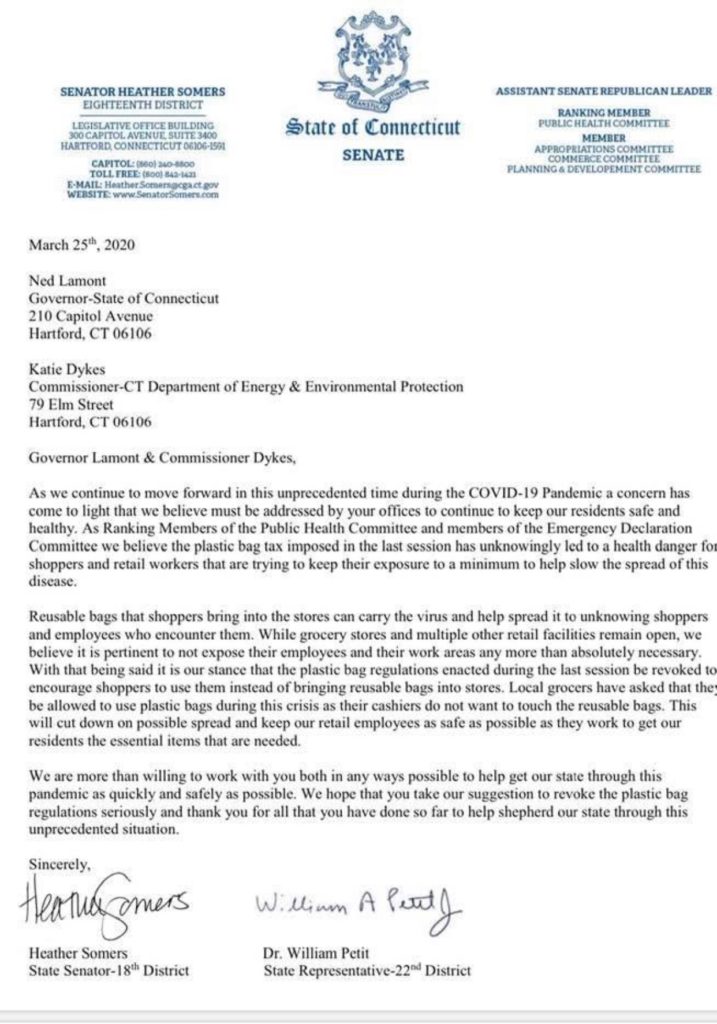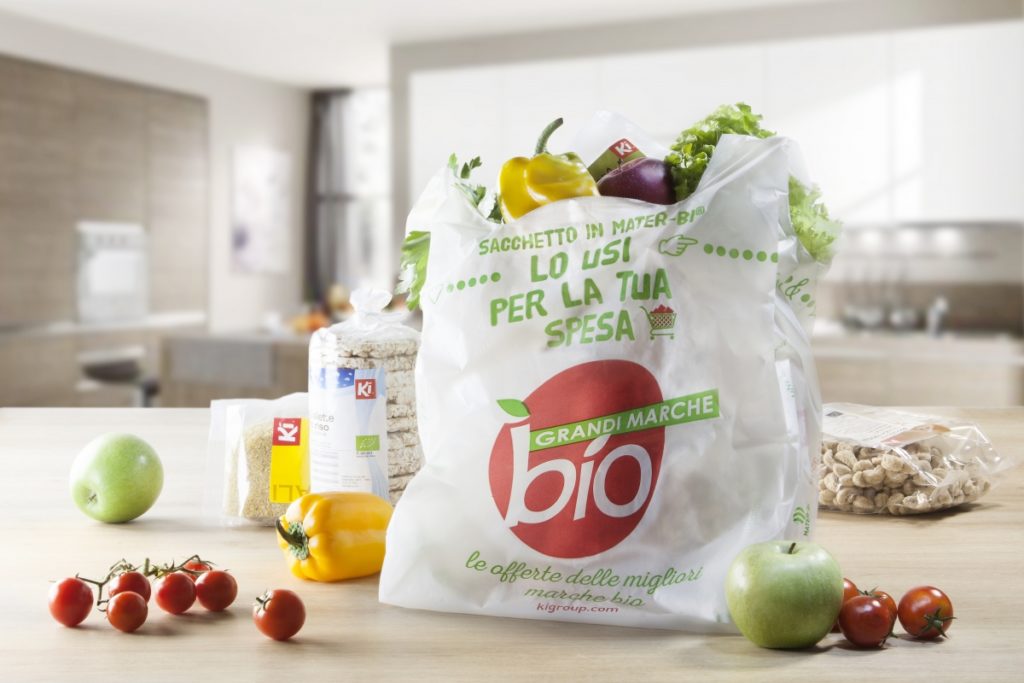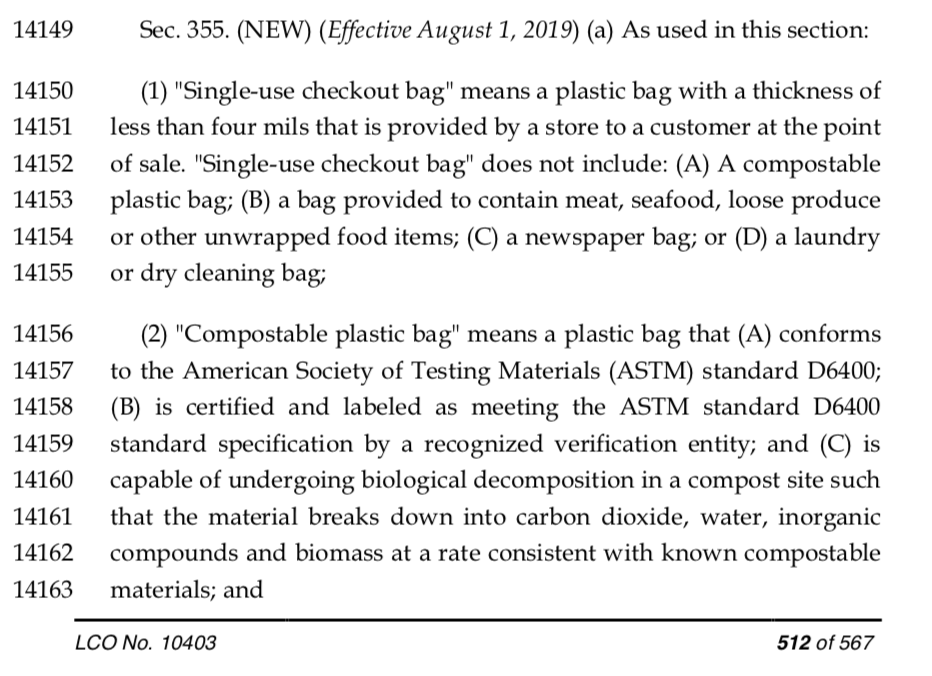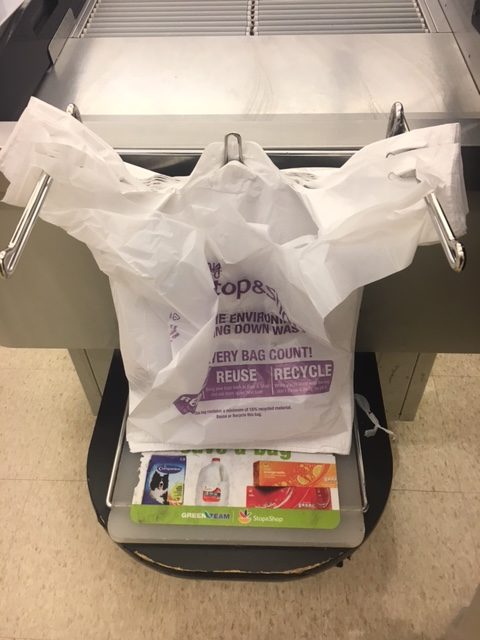As states New York and Maine are pulling back on single-use plastic grocery bag bans in the wake of the COVID-19 outbreak, Connecticut may have missed an opportunity to not only have environmentally safe single-use grocery bags, but also bring more business and jobs to the state.
New York’s Gov. Andrew Cuomo has since delayed New York’s plastic bag ban, Maine Gov. Janet Mills has pushed back the date of the state’s ban until 2021 and Massachusetts Gov. Charlie Baker has now banned reusable shopping bags from grocery stores.
Op-eds and editorials published in the New York Post and Wall Street Journal pointed to studies showing that reusable bags have the potential to carry the virus and now some grocery stores in Connecticut are banning reusables to protect their workers and a 2018 study by the National Environmental Health Association found reusable bags transmitted viruses to other surfaces and people’s hands.

Rep. William Petit, R-Cheshire, and Sen. Heather Somers, R-Groton, who both serve of Connecticut’s Public Health Emergency Committee, are now calling on Gov. Ned Lamont to revoke Connecticut’s plastic bag regulations.
“While grocery stores and multiple other retail facilities remain open, we believe it is pertinent to not expose their employees and their work areas any more than absolutely necessary,” Somers and Petit wrote to Lamont and DEEP Commissioner Katie Dykes. “With that being said it is our stance that the plastic bag regulations enacted during the last session be revoked to encourage shoppers to use them instead of bringing reusable bags into stores.”
Connecticut’s Gov. Ned Lamont instituted a 10-cent plastic bag tax as part of his 2019 budget, which hoped to take in $28 million from the tax before outright banning single-use plastic grocery bags in July of 2021.
The tax didn’t work out as planned, taking in only $7 million as many grocery stores stopped providing single-use plastic bags and instead started charging shoppers for paper grocery bags.
But many shoppers, not wanting to pay the tax or pay for paper bags, moved toward using reusable plastic or canvass bags for their grocery shopping needs. Although a loss for the state’s budget expectations, proponents of the plastic bag ban called it a win for the environment.
However, Connecticut missed an opportunity to not only keep single-use plastic bags in the marketplace during the health crisis but also make an environmentally-friendly change and bring business to Connecticut.
The Shelton-based company Novamont North America produces a “Mater Bi” biopolymer made from forms of sugar, starch and plant oils that are used to create single-use compostable bags that breakdown naturally in soil and leave no toxicity behind.

The biopolymer is certified compostable by the Biodegradable Products Institute. Their product was exempted from France’s 2017 ban on single-use plastic grocery bags and is often used for bagging meat and vegetable products in Europe, according to the company’s website.
The original 2019 budget bill exempted certified compostable bags from the plastic bag tax and eventual ban but, following a caucus meeting by House Democrats, the compostable bag exemption was stripped from the budget language.
According to the initial budget language a compostable plastic bag was defined as one that conforms to the American Society of Testing Materials standards and “is capable of undergoing biological decomposition in a compost site such that the material breaks down into carbon dioxide, water, inorganic compounds and biomass at a rate consistent with known compostable materials” – standards that Novamont’s Mater Bi biopolymer meets.

Novamont was set to expand their operations and build its North America Mater Bi compounding facility in Connecticut and was working with the Department of Economic and Community Development to identify a facility site, according to Julie Cammarata of Cammarata Government Associates, a lobbyist for Novamont at the Capitol.
However, stripping the compostable bag exemption from the budget effectively banned their product in Connecticut.
When the Department of Revenue Services released their guidance on the plastic bag tax, compostable bags were included along with normal single-use plastic bags.
You can decide to ban plastic bags if you want to, but if you’re going to keep paper bags you should allow compostable bags because they break down the same way.
Julie Cammarata, Principal, Cammarata Government Affairs
“You can decide to ban plastic bags if you want to,” Cammarata said, “but if you’re going to keep paper bags, you should allow compostable bags because they break down the same way.”
Cammarata says the language was stripped from the budget after “faulty” information was distributed at the Capitol by the Citizens Campaign for the Environment.
According to a handout from CCE, “Despite being derived from plant-based materials, bioplastics are still plastic. If not disposed of properly, they too can pollute having devastating impacts on our environment.”
However, lawmakers who stripped the compostable bag language from the budget might have missed a caveat noted in CCE’s handout.
“The Federal Trade Commission defines a biodegradable product as one that will ‘completely decompose into elements found in nature within a reasonably short period of time after disposal.’ This means that truly biodegradable materials will break down naturally, into materials that are safe for consumption by living organisms within a reasonable time frame.”
In essence, the language outlined in the budget would have met the FTC’s standard of biodegradable.
The CCE literature noted that The American Society for Testing and Materials did not test the breakdown of biodegradable materials in water.
Novamont was back at the Capitol in 2020 testifying in support of a new bill that would have allowed for their compostable bags to be used in curb-side food waste disposal, a bill supported by Katie Dykes, commissioner of the Department of Energy and Environmental Protection.
However, as the public health crisis continues, and states are either waiving plastic bag bans or banning re-useable bags, Connecticut may have missed an opportunity to not only bring jobs and more business to the state but to have had a safer single-use grocery bag available in stores.


Bill
April 2, 2020 @ 7:59 am
Why are we still paying $.05 for bottle and can deposits but are NOT able to recycle them for credit?
Stop the charges and help us all . I have 6 large bags in my garage with nowhere to go .